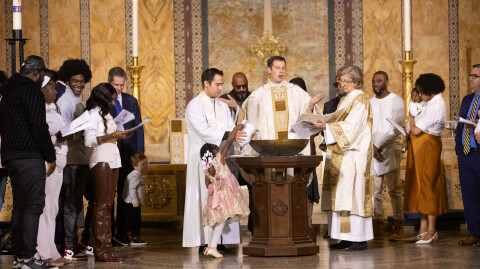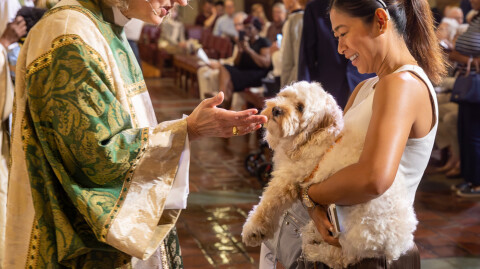Each February, as the nation observes Black History Month, many Episcopalians participate in an additional observance: the Feast of Absalom Jones. Jones was the first Black priest in the Episcopal Church and the founder of the African Episcopal Church of St. Thomas in Philadelphia, the first Black parish in the Episcopal Church.
(At this coming Sunday’s installment of The Forum, we will hear from the Reverend Dr. Mark Bozzuti-Jones, a former member of the clergy staff here at St. Bart’s who has written a new book called Absalom Jones, America’s First Black Priest. Members of St. Bart’s also have the opportunity to attend the annual Absalom Jones Celebration of the Episcopal Diocese of New York, at which our Presiding Bishop, the Most Reverend Michael Curry, will be preaching. Virtual and in-person participation are both possible.)
I have long known that Absalom Jones founded St. Thomas after experiencing segregation at St. George’s Methodist Episcopal Church. I have long known, too, about Jones’ association with Richard Allen, who attended St. George’s with Jones, joined Jones in leading the Free African Society of Philadelphia, and would go on to found the African Methodist Episcopal (A.M.E.) denomination.
But I had not realized until recently that, for its time and place, St. George’s Methodist Episcopal was a relatively progressive community. Jones began attending St. George’s after he was granted his freedom from slavery, no longer interested in worshiping at the segregated Episcopal parish his former master frequented. When Jones first arrived at St. George’s, it was a place that was at least somewhat welcoming to free Black worshipers. Jones and other African-Americans were not treated as completely equal members of the church, but the church did license Allen and Jones as lay preachers, and the number of Black members at St. George’s rose dramatically over the course of several years, suggesting that Black congregants were to a certain extent comfortable there.
However, as the number of Black members rose, white leadership at St. George’s felt increasingly threatened and imposed several new segregation measures. Incensed, Jones, Allen, and others eventually left St. George’s behind in order to build Black-only religious spaces in which the dignity of Black Christians could be more fully recognized and honored.
It is important to note that it wasn’t the most bigoted white and backwards of Christians who caused Jones and Allen such distress; it was the more enlightened white Christians who were at first willing to welcome Allen and Jones into their ranks and even designate them as ministers of the Gospel. Anxious that an influx of black members could fundamentally change their community and unsettle its established hierarchies of leadership, the white members of St. George’s ultimately revealed the true extent of their deep-seated racism.
Though I'm not proud to say so, I do find it somewhat reassuring to think about all the people out there who are much more bigoted and prejudiced than me. Surely, I can’t be that bad if I show a greater commitment to diversity, justice and equality than those who are more blatantly racist, misogynist and xenophobic?
But even progressives can cause pain. Absalom Jones’ story reminds us of how essential it is to keep challenging our own assumptions and prejudices and to keep pushing ourselves to be even more inclusive—and even more committed to God’s reign of justice and love.




